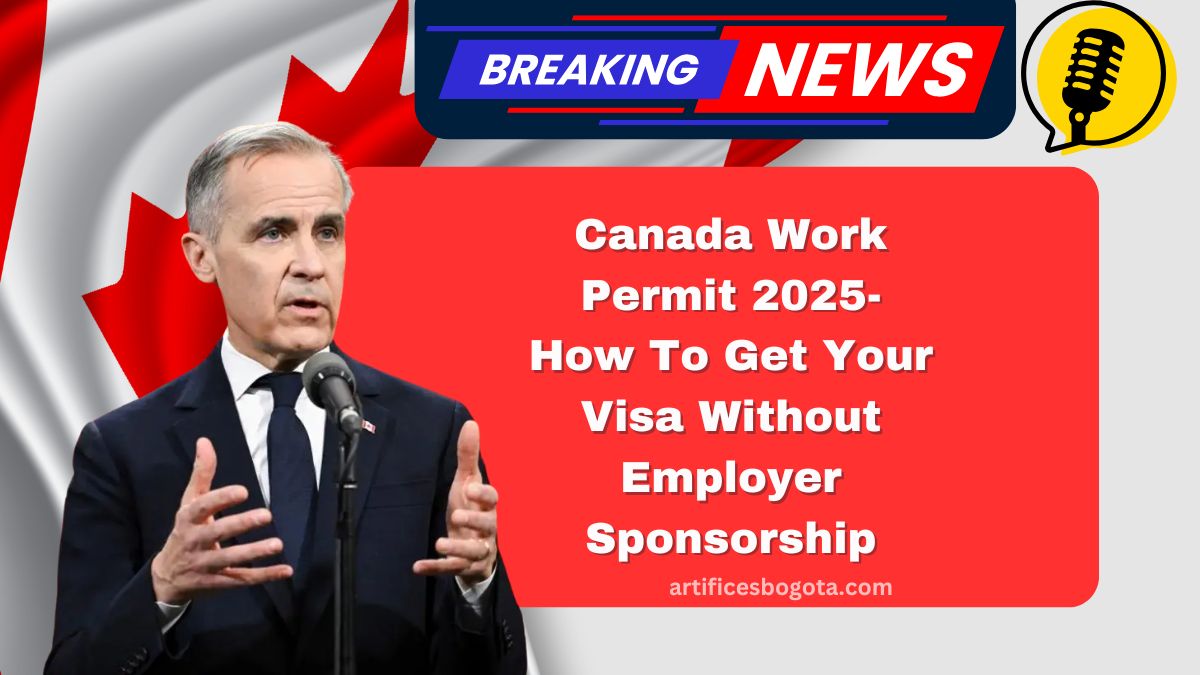In 2025, Canada introduced several new work permit regulations that give individuals greater freedom to work without the need for employer sponsorship.
This change aims to support foreign workers who want to pursue employment opportunities in Canada independently. Whether you are a student, an entrepreneur, or someone with provincial support, these updated laws could benefit you.
This article will outline the latest updates to Canada’s work visa laws, the eligibility criteria for each type of permit, and how to apply for a work visa without employer sponsorship.
Types of Work Permits Available Without Employer Sponsorship
1. Open Work Permit (OWP)
An Open Work Permit (OWP) is the most flexible work visa, allowing individuals to work for any employer in Canada without needing a specific job offer or Labor Market Impact Assessment (LMIA).
This is particularly beneficial for spouses of international students, temporary foreign workers (TFWs), and foreign workers with provincial support.
Eligibility for Open Work Permits
| Eligibility Group | Details |
|---|---|
| Spouses of International Students | Married to students enrolled in a master’s, doctorate, or professional degree program |
| Spouses of TFWs | Must work in high-demand occupations (TEER 0, 1, 2, or 3) |
| Foreign Workers with Provincial Support | Requires provincial nomination (Alberta, Manitoba, Yukon) |
2. Post-Graduation Work Permit (PGWP)
The Post-Graduation Work Permit (PGWP) allows international students who have completed a program at a designated learning institution (DLI) in Canada to work without employer sponsorship.
The duration of the PGWP depends on the length of the study program, with graduates of a two-year program receiving a three-year permit.
3. Self-Employed Work Permit
For individuals looking to work independently, the Self-Employed Work Permit is ideal. It is designed for business owners, independent contractors, and professionals such as artists and tech entrepreneurs. Applicants must demonstrate how their work will benefit Canada’s economy or culture.
Eligibility for Self-Employed Work Permits
| Eligibility Criteria | Details |
|---|---|
| Self-Employed Professionals | Entrepreneurs or workers who contribute to Canada’s cultural or economic development |
4. Provincial Nominee Programs (PNPs)
Some provinces in Canada offer Provincial Nominee Programs (PNPs) that allow workers to apply for a temporary work visa.
These permits are available to individuals nominated by provinces like Alberta or Manitoba. PNPs often lead to permanent residency.
5. International Experience Canada (IEC)
The IEC program is aimed at young professionals aged 18-35 from select countries. This program allows individuals to work and travel in Canada for up to two years without needing an employer’s sponsorship.
How to Apply for a Canada Work Permit Without Employer Sponsorship
The process to apply for a work permit without employer sponsorship is straightforward. Follow these steps to increase your chances of approval:
Step 1: Determine Eligibility
Before applying, identify which program suits your situation. You can choose from the Open Work Permit, Post-Graduation Work Permit, Self-Employed Work Permit, or a Provincial Nominee Program.
Step 2: Gather Required Documents
You’ll need to collect the following documents for your application:
- Passport and valid identification
- Educational credentials (if applicable)
- Proof of work experience (if applicable)
- Proof of funds (if required)
- Any supporting letters from provincial governments (for PNP applicants)
Step 3: Apply Online
Submit your application online through the Immigration, Refugees, and Citizenship Canada (IRCC) portal.
Step 4: Biometrics & Medical Exam
You may need to provide biometrics or undergo a medical exam, depending on the type of permit you are applying for.
Step 5: Wait for Processing
After submitting your application, wait for approval. Processing typically takes between 8-12 weeks, depending on the type of permit and individual circumstances.
Benefits of Canada’s Updated Work Visa Laws
Canada’s updated work visa laws offer more flexibility for foreign workers. The introduction of Open Work Permits, PGWPs, and Provincial Nominee Programs provides numerous opportunities for individuals to enter the Canadian workforce without needing employer sponsorship.
These updates cater to a broader range of applicants, from international students to entrepreneurs, enhancing Canada’s global appeal as a destination for skilled workers and entrepreneurs.
Canada’s new work visa laws in 2025 offer increased opportunities for skilled individuals to work without employer sponsorship.
Whether through Open Work Permits, Provincial Nominee Programs, or Self-Employed Visas, the government’s commitment to attracting global talent is clear.
By following the application process and meeting the eligibility criteria, prospective workers can enhance their chances of securing a work permit and contributing to Canada’s economy.
FAQs
Who is eligible for an Open Work Permit (OWP)?
Spouses of international students and temporary foreign workers employed in high-demand jobs, as well as foreign workers with provincial support, are eligible for the OWP.
What is the Post-Graduation Work Permit (PGWP)?
The PGWP allows international students who have graduated from a designated learning institution (DLI) in Canada to work in the country for a duration based on their program length.
Can I apply for a work permit if I want to start my own business in Canada?
Yes, the Self-Employed Work Permit is designed for entrepreneurs and self-employed individuals who will contribute to Canada’s economy or culture.
